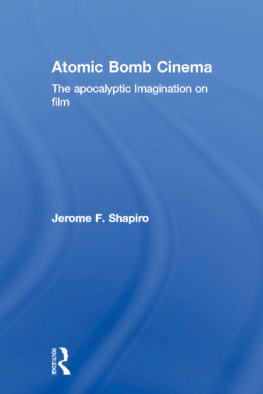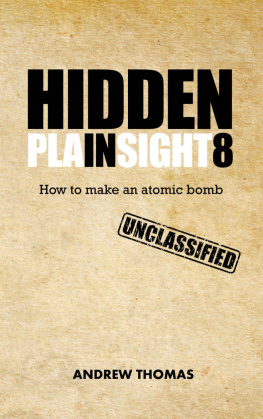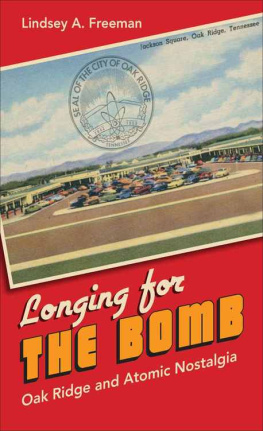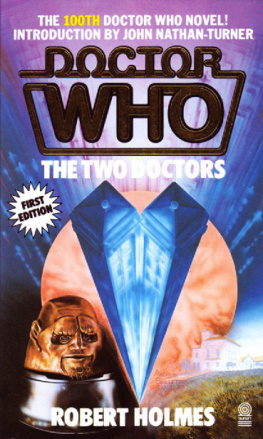About the Author
BOB JACKSON lectures in Creative Media at the Institute of Technology, Tralee. He produced the feature documentary A Doctors Sword , which was released in Irish cinemas in 2015 and was nominated for an IFTA award in 2016. Bob also works in music production, and lives in Cork city.
Stay up to date with the author at:
www.adoctorssword.com
facebook.com/adoctorssword
@ADoctorsSword
The DVD of the documentary is available at:
www.wildcarddistribution.com/product/doctors-sword
For Stephanie
PRAISE FOR A DOCTORS SWORD DOCUMENTARY
The word awesome has been much abused in recent times, but the story told in A Doctors Sword fully deserves that description, and the film ensures that Dr Aidan MacCarthy will take his place in the pantheon of Irish heroes.
Irish Examiner *****
Incident packed a gripping saga
The Irish Times ****
Wonderful stuff
Entertainment.ie ****
Stirring story of endurance and survival
Irish Independent
A fantastic story of shocking suffering and extraordinary endurance and bravery
Sunday Independent
PRAISE FOR A DOCTORS WAR BY AIDAN MACCARTHY
Jaw-dropping account of life as an RAF doctor during the Second World War Pete McCarthy, author of McCarthys Bar
A stranglehold of a book
Ireland on Sunday
Quite unlike any other war memoir
Sunday Tribune
Riveting, sometimes harrowing tale
The Village
An engrossing and uplifting read
The Irish Times
A gripping read
Evening Echo
Reads like the screenplay of an Oscar winner.
Irish Independent
Dr Aidan MacCarthy, shortly after joining the RAF.
I n early January 1944, a steam train slowly dragged a line of rusting metal goods wagons north-west through Java towards its destination, Batavia (now Jakarta). Its human cargo of emaciated prisoners of war had been crammed by their Japanese guards into the wagons in the stifling heat. This was two years into their captivity. Starvation, brutality, disease and death had dominated their lives since they became prisoners of the Imperial Japanese Army in March 1942.
Inside the wagons the prisoners gasped for air amid the stink and filth of human waste. They were given no water or food. Eventually the train arrived at Batavia the doors of the wagons were opened and the prisoners spilled out. The first thing that hit them was the unbearable heat and humidity; their previous camp had been in the mountains where the temperatures were cooler and the humidity less severe.
The prisoners were pushed, beaten and screamed at, counted, made to stand to attention, then counted again. Then they were marched to their destination: Cycle Camp, a former Dutch Army barracks with a terrifying reputation. This was mostly due to its commandant, Lieutenant Kenichi Sonei, who was waiting for the prisoners at the gates, eager to make a lasting impression on the new arrivals. To demonstrate his willingness to use violence, he beat and screamed orders and abuse at guards as well as prisoners. Among them was Aidan MacCarthy, a young Irish doctor. Many years later, he recalled Soneis welcome to the prisoners with dread:
This is a hard place and you will be treated hard. Any breach of discipline will be punished by a beating. Any attempt at escape will be punished by death.
They were marched through the gates and barbed-wire fences into the camp, lined up under the full glare of the tropical sun, then beaten and counted again. Ordered to stand to attention without moving, they were denied water, use of toilets and rest. Anyone who moved was beaten. After two long hours Sonei, obviously enjoying the power he had over his captives, screamed:
You are all criminals and you deserve nothing. You are criminals because you are allied to the American bastards who are trying to destroy our glorious empire. In this camp we shall show you the error of your ways. In this camp you will learn how strong and invincible the Japanese people are.
MacCarthys heart sank. Soneis body language and pronouncements made it clear that he was insane. All MacCarthy could do was pray for the strength to endure what lay ahead as his life was now in the hands of a maniac. He was a million miles from home.
H ome for Aidan MacCarthy was Castletownbere, a small fishing town on the Beara Peninsula in west Cork. The peninsula is one of five that extend out into the Atlantic Ocean from the south-west coast of Ireland. Castletownbere lies on the northern shore of Bantry Bay. Its sheltered harbour is protected from the open seas and wild Atlantic storms by the hills of Bere Island, which lies about a mile off the mainland. The scenery is dramatic and the weather erratic. The rugged hills of the Caha Mountains are mostly bare sandstone, dotted with patches of bog. Lower down towards the sea, small fields and clusters of forestry compete for the scarce fertile soil. The climate is mild and temperate due to the effects of the Gulf Stream and during the summer it can seem almost tropical with patches of evergreen trees right down to the shore. But during winter, this jagged coastline on the edge of Europe is battered with numbing regularity by ferocious Atlantic storms.
The MacCarthys lived in an apartment above the family business, MacCarthys Bar and Grocer on the Square in the centre of the town.
In 1860, Aidans grandfather Michael began the business when he was thirty-three years old. He was bright, athletic and resourceful. He had decided it was time to take the plunge and open his grocery store on the main square of the town. Over time, Michael built up his trade as a general merchant and later began supplying the Royal Navy base in the harbour. Britain had kept a permanent naval presence at Fort Berehaven in Bantry Bay since the failed French invasion attempt in 1796. Michael bought fish locally, which he salted and sold to feed the crews of the large ships that were stationed in the harbour. He later expanded his interests, importing anything that was in demand, including coal and salt. Michaels reputation as a businessman with a sharp mind made him a prominent figure in what was quickly becoming a thriving port in the latter half of the nineteenth century.
MacCarthys Bar in Castletownbere today. BOB JACKSON
At the time, the only places selling alcohol in the town were shebeens illegal, unlicensed drinking houses serving poitn (bootleg alcohol distilled from potatoes and wheat). One day, a representative from a brewery in Dublin arrived in the town to court businessmen interested in obtaining a licence to sell beer, wine and spirits. He entered McCarthys General Supply Store and Michael was naturally interested. When his wife, Eileen, a devoutly religious woman, overheard the conversation taking place in the shop she was horrified. This was the era of the pious temperance movement in Ireland and she was not willing to tolerate the sale of alcohol on the premises. Soon after, McCarthys General Supply Store became one of the first licensed premises in the town.










